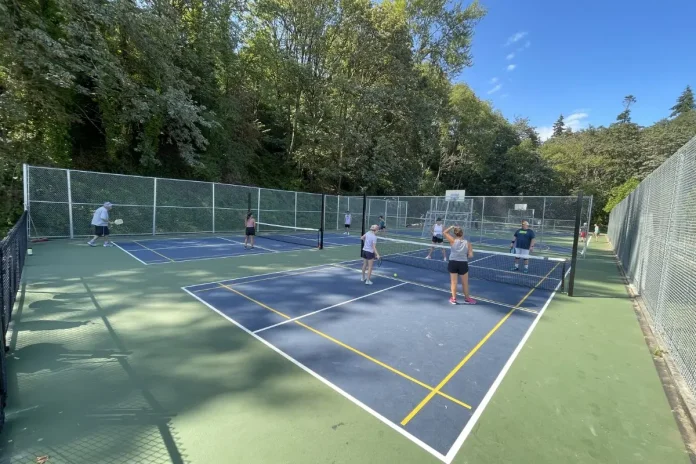Magnuson Park Pickleball Courts: Environmental and wildlife advocates are raising concerns about a proposal to build lighted pickleball courts at Seattle’s Magnuson Park by 2026. While pickleball fans are excited about the new courts, environmental groups worry that the development could disrupt the park’s restored wetlands and negatively affect local wildlife.
Growing Demand for Pickleball Courts
The popularity of pickleball is growing rapidly in Seattle. At Green Lake Park, players often face 30-45 minute waits for court availability due to the sport’s increasing demand. Peter Seitel, from the Green Lake Pickleball Group, emphasized the sport’s accessibility, stating,
“The sport is so popular because pickleball is an easy game to pick up.” – (Peter Seitel)
Many local players, including Megan Stansbury, have called on Seattle Parks to create more pickleball courts to meet the demand.
However, Seitel acknowledged a potential issue: “Noise is a problem, no doubt about it.” Kevin Bergsrud, Senior Planner for Seattle Parks & Recreation, confirmed that the proposed plan includes a design for at least eight pickleball courts.
Environmental Concerns and Impact on Wildlife
Magnuson Park is home to restored wetlands and serves as a sanctuary for various bird species and wildlife. Joshua Morris, Urban Conservation Manager at Birds Connect Seattle, voiced concern over the noise pollution caused by pickleball courts.
“Pickleball is famously noisy. Noise is a known environmental pollutant, and we are working to suggest that the city find a more suitable location that protects taxpayer investment and habitat. Directly at courtside there are loud sound bursts of up to 120 decibels and that’s enough to be painful to the ear.” – (Joshua Morris)
Morris described the noise level near pickleball courts as intense, with bursts reaching up to 120 decibels—loud enough to cause ear pain.
Wildlife advocates are urging Seattle Parks to consider relocating the courts to a more developed area of the park. Morris proposed an alternative location near a parking lot west of Arena Sports, an area that would not disrupt wildlife.
Advocacy and Public Response
In response to the planned courts, Birds Connect Seattle has started a petition urging the city to halt the development of pickleball courts near the wetlands.
The petition calls for the rejection of updates to the Magnuson Park Master Plan that would allow for such development, and for the adoption of biodiversity-sensitive urban design protocols.
Several pickleball players, such as Katherine Elkort, have expressed support for finding an alternative location for the courts.
“Nature is pretty special and I think as the world becomes more industrialized and as people grow and expand in cities, it’s going to require a huge effort on individuals and communities to protect that nature.” – (Katherine Elkort)
“I hope that somehow the people who run this lovely city, will find a way to put the courts outside of the way of the wetlands so that the animals habitat can be protected.” – (Katherine Elkort)
The Bigger Picture
While the demand for pickleball courts in Seattle continues to grow, concerns about preserving the city’s natural spaces are at the forefront.
Environmental groups argue that the noise from pickleball courts could disrupt not only the wildlife but also the peace and tranquility that residents seek when visiting the wetlands.
As the debate continues, it is clear that finding a solution that balances the growth of pickleball and the protection of natural habitats will be crucial.
News in Brief: Magnuson Park Pickleball Courts
Environmental groups are concerned that proposed pickleball courts at Seattle’s Magnuson Park will harm local wildlife, particularly birds living near restored wetlands. Advocates urge the city to reconsider the location and adopt measures to protect biodiversity while accommodating the growing popularity of the sport.
ALSO READ: New Pickleball Facility in Winnipeg Promises Pickleball’s Growth in Headingley

